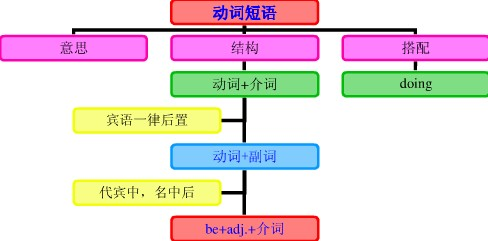本试题 “Book Three of Vocational English_____ 12 units.[ ]A. is made ofB. are made ofC. is made up ofD. are made up of” 主要考查您对动词短语
一般现在时的被动语态
等考点的理解。关于这些考点您可以点击下面的选项卡查看详细档案。
- 动词短语
- 一般现在时的被动语态
动词短语的概念:
动词常和某些其他词类用在一起,构成固定词组,形成所谓短语动词(phrasalverb)。和动词一样,短语动词也可分为及物和不及物两种。短语动词可以作为一个整体看待,同一般动词一样使用。
动词短语的搭配类型:
1)动词+介词:这类短语动词用作及物动词,后面须跟宾语。
如:The small boy insisted on going with his parents. 那男孩坚持要跟父母一起去。
Do you often listen to broadcasts in English? 你常听英语广播吗?
Look at the children. Aren't they lovely? 看着这些孩子们。他们多么可爱呀!
We stand for self-reliance. 我们是主张自力更生的。
这一类的短语动词还有很多,如depend on(upon)(依靠),wait on(服侍),look for(寻找),deal with(对待),look after(照料),wait for(等待)等。
2)动词+副词:
这类短语动词有的用作及物动词,有的用作不及物动词。
如:I always get up as soon as the bell rings. 我总是一打铃就起床。(不及物)
Look out, there's a car coming! 当心,来汽车了!(不及物)
Have you handed in your exercises already? 你已经交练习了吗?(及物)
Please don't forget to put on your coat, it's cold outside. 请不要忘记穿外衣,外面很冷。(及物)
这一类的短语动词还有很多,及物如put out(扑灭),eat up(吃光),put down(放下);不及物如set off(出发),come up(走近),go on(继续)。
注:"动词+副词"这类短语动词和上面第一类"动词+介词"的不同之处在于:"动词+介词"用作及物动词,后面须跟宾语。"动词+副词"则有的及物,有的不及物;用作及物动词而宾语为人称代词或自身代词时,副词往往放在宾语之后。
如:Please wake me up at five tomorrow. 请在明天早上五点唤醒我。
If you have done your exercises, please hand them in. 如果你们练习做完了请交来。
She doesn't normally behave like that, she's putting it on. 她通常并不如此表现,她是装出来的。
注:这类短语动词有不少可兼作及物和不及物动词用。
如:He took off his hat when he entered the office. 他进办公室后脱下帽子。(及物)
The plane took off at seven sharp. 飞机在七点整起飞。(不及物)
Charlie rang up Neil to ask about the time of the meeting. 查理打电话给尼尔问开会的时间。(及物)
If you can't come, please ring up and let us know. 你如来不了,请来电话告诉我们一声。(不及物)
3)动词+副词+介词:
"动词+副词"之后有的可以再加一个介词,形成另一种短语动词。这类短语动词用作及物动词。
如:Do not give up hope. We must go on with the experiment 不要失望。我们必须继续试验。(go on with继续)
He came up to me. 他走到我跟前。(come up to走近)
这类短语动词还有:look down upon(看不起),do away with(去掉),put up with(忍受)等。
4)动词+名词+介词:
这类短语动词也是及物的。
如:He shook hands with all the guests at the banquet. 他在宴会上和宾客一一握手。
Young pioneers often come to the Children's Palace to take part in after school activities.少先队员经常到少年宫来参加课外活动。
Pay attention to the temperature of the stored rice. 注意仓库里的稻谷的温度。
Her job is taking care of the babies. 她的工作是照顾婴儿。
这一类短语动词还有:put an end to(结束),take notice of(注意),catch hold of(抓住),lose sight of(看不见),make use of(利用)等。
动词短语知识体系:

一般现在时的被动语态的概念:
表示的是一般现在时态和被动语态的叠合。构成:(am/is/are +done)
如:This shirt is washed once a week. 这件T恤一周洗一次。
主动语态变被动语态的方法:
1、把主动语态的宾语变为被动语态的主语。
2、把谓语变成被动结构(be+过去分词),根据被动语态句子里的主语的人称和数,以及原来主动语态句子中动词的时态来决定be的形式。
3、把主动语态中的主语放在介词by之后作宾语,将主格改为宾格。
例如:All the people laughed at him.=He was laughed at by all people.
They make the bikes in the factory.=The bikes are made by them in the factory.
记忆歌诀:
宾变主,主变宾,by短语后面跟。
谓语动词变被动,be后“过分”来使用。
含有情态动词的被动语态:
含有情态动词的主动句变成被动句时,由“情态动词+be+过去分词”构成,原来带to的情态动词变成被动语态后“to”仍要保留。
记忆歌诀:
情态动词变动,情态加be加“过分”,原来带to要保留。
例如:We can repair this watch in two days.=This watch can be repaired in two days.
You ought to take it away.=It ought to be taken away.
They should do it at once.=It should be done at once.
被动语态的用法:
1、不知道或没有必要说明动作的执行者是谁。
例如:Some new computers were stolen last night.一些新电脑在昨晚被盗了。(不知道电脑是谁偷的)
This book was published in1981.这 本书出版于1981年。
2、强调动作的承受者,而不强调动作的执行者。
例如:This book was written by him. 这本书是他写的。
Eight hours per day for sleep must be guaranteed. 每天8小时睡眠必须得到保证。
记忆歌诀:
谁做的动作不知道,说出谁做的没有必要;动作承受者需强调,被动语态运用到。
一般现在时的被动语态:
一、被动语态的结构:
主语(动作接受者)+is/am/are+动词的过去分词+(by+动作执行者)
如:Football is played in most countries in the world.
被动语态的句型总结如下:
1、肯定句:主语+be+过去分词+(by~~).
如:The boy is called Jack.
2、否定句:主语+be not+过去分词+(by~~).
如:The baby is not looked after by his father.
3、一般疑问句:Be+主语+过去分词+(by~~)?
如:Is KingLear written by Shakespeare?
4、特殊疑问句:特殊疑词+be+过去分词+(by~~)?
如:What is this kind of sweater made of?
二、被动语态的用法:
1、要表达“被…”、“受…”、“让…”、“遭…”之类的语义。
如:The teachers are well respected.
The child is well loved by people.
2、强调动作承受者。
如:He is known far and wide. 他远近闻名。
3、不知道式没有必要指出动作的执行者。
如: The room is cleaned every day. 房子每天都有人打扫。
4、为礼貌起见避免提及动作执行者。
如:I wonder if I was allowed to introduce myself? 我是否可以做自我介绍?
与“Book Three of Vocational English_____ 12 units.[ ]A. is m...”考查相似的试题有:
- Your plan is far from satisfaction , so you must ______ more time and energy to it.A.earnB.spendC.devoteD.waste
- All the children are busy going over their lessons as the final exam is __________.A.along the wayB.in the wayC.on...
- ——Not getting that job was a big let-down.——Don’t worry. Something better will ____.A.come alongB.take onC.go byD...
- He‘d _________a volleyball court on the beach with stick.A.turned outB.marked outC.made outD.broken out
- If you have any difficulty with this paper, you can _______ your notebooks.A.focus onB.carry onC.refer toD.go with
- All his money had been ______,so he had to make a living by begging.A.used upB.taken upC.made upD.picked up
- Many political leaders attended the conference and among those present ____ the foreign minister and his wife.A.were...
- It was hunger that his great-grandfather amd grandfather _________.A.died ofB.died outC.died downD.died away
- Measures have to be taken to teach young people how to ______ themselves both in family and in school. They don’t kno...
- Although some unexpected difficulties have ________ in the process, we are confident that we can handle them.A.risen...